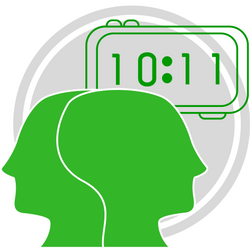Your mind

We traditionally think of your mind as being divided into two aspects – the conscious and the unconscious (sometimes called the subconscious).
The conscious mind is the thinking, planning and experiencing part of your brain. Knowing the right way to think, having planning strategies, and choosing your experiences is an important part of improving your life, and I can help you with that.
On a deeper level, many of our behaviours, habits and decisions are based on the work of your unconsious mind. This part of your brain is responsibile for the vast majority of your experience and there is still a great deal that we don’t understand. When changes are made at the unconscious level they can be incredibly powerful. Many of the techniques that I use are drawn form Neurolinguistic Programming (NLP), Hypnosis and Timeline Therapy. These techniques are designed to work safely with the unconsious mind. You can change habits, overcome phobias and PTSD, and overcome anxiety and overwhelming emotions, using these approaches.
As well as the links in the text above, below are a selection of articles that explore different aspects of the mind. They explore the way we process our experience and how we think.
- How to be more Positive: try this strategy 3 times daily
 Learning how to be more positive is not just a nice thing to have — it’s essential for maintaining mental and emotional well-being. One of the most effective yet underappreciated methods to foster positivity is through the recognition and celebration of ‘glimmers.’ When you can just be aware of a moment of joy, safety, and …
Learning how to be more positive is not just a nice thing to have — it’s essential for maintaining mental and emotional well-being. One of the most effective yet underappreciated methods to foster positivity is through the recognition and celebration of ‘glimmers.’ When you can just be aware of a moment of joy, safety, and …How to be more Positive: try this strategy 3 times daily Read More »
- Using NLP for Procrastination: 5 Action Steps to Get Stuff Done Now
 Ah, procrastination. That timeless villain in the saga of “Why Isn’t This Done Yet?” You know you’ve got important stuff to do, but somehow, your social media feed looks so much more appealing. Sound familiar? Well, there is no better time that the present to learn NLP for procrastination. So why not get going? 1. …
Ah, procrastination. That timeless villain in the saga of “Why Isn’t This Done Yet?” You know you’ve got important stuff to do, but somehow, your social media feed looks so much more appealing. Sound familiar? Well, there is no better time that the present to learn NLP for procrastination. So why not get going? 1. …Using NLP for Procrastination: 5 Action Steps to Get Stuff Done Now Read More »
- 4 Steps to Reframing Confidence in Scary Situations
 A core component of Neuro-Linguistic Programming (NLP) is the technique of reframing, which essentially means changing your perspective towards a particular situation to feel and behave more constructively. Reframing confidence is not about deceiving yourself or ignoring problems; it’s about choosing to view situations in a light that can empower and motivate. When applied correctly, …
A core component of Neuro-Linguistic Programming (NLP) is the technique of reframing, which essentially means changing your perspective towards a particular situation to feel and behave more constructively. Reframing confidence is not about deceiving yourself or ignoring problems; it’s about choosing to view situations in a light that can empower and motivate. When applied correctly, …4 Steps to Reframing Confidence in Scary Situations Read More »
- How to Stop Worrying in Just 5 Minutes!
 I recently had the honor of joining Joanne Mallon, an accomplished coach and author of 7 books, on her insightful podcast series, “5 Minutes to Change Your Life.” In this episode, aptly named “How to Stop Worrying,” we explore a game-changing technique that can help you reduce worry and regain control over your life. If …
I recently had the honor of joining Joanne Mallon, an accomplished coach and author of 7 books, on her insightful podcast series, “5 Minutes to Change Your Life.” In this episode, aptly named “How to Stop Worrying,” we explore a game-changing technique that can help you reduce worry and regain control over your life. If … - What’s the Best Breathing Technique for Anxiety?When you are anxious, managing your breathing can make a real difference. There are lots of different techniques out there. So which one is the best breathing technique for anxiety? The answer is, the one that is easiest to do! You don’t want to be messing about with counting breaths in and pondering whether you …
What’s the Best Breathing Technique for Anxiety? Read More »
- Magic Metaprograms: Are you ‘away from’ or ‘towards’?
 Metaprograms are the tendencies that each individual has to behave in certain ways. There are a number of different forms they can take. For example: is your ‘map of the world’ (see my blog “I finally get getting there”) a generally positive one, or typically erring on the side of negativity? How you respond to …
Metaprograms are the tendencies that each individual has to behave in certain ways. There are a number of different forms they can take. For example: is your ‘map of the world’ (see my blog “I finally get getting there”) a generally positive one, or typically erring on the side of negativity? How you respond to …Magic Metaprograms: Are you ‘away from’ or ‘towards’? Read More »
